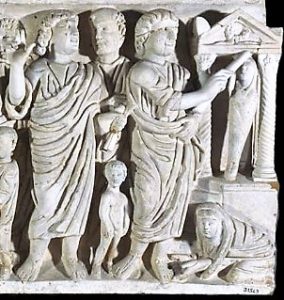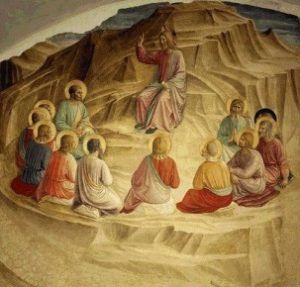Jesus, teacher of happiness
“Blessed are the poor in spirit, for theirs is the kingdom of heaven.
“Blessed are those who mourn, for they will be comforted.
“Blessed are the meek, for they will inherit the earth.
“Blessed are those who hunger and thirst for righteousness, for they will be filled.
“Blessed are the merciful, for they will receive mercy.
“Blessed are the pure in heart, for they will see God.
“Blessed are the peacemakers, for they will be called children of God.
“Blessed are those who are persecuted for righteousness’ sake, for theirs is the kingdom of heaven.
Matthew 5:3-10
1.
In Matthew’s telling Jesus ascends the mountain, a teacher of holiness like Moses.
You will know that Moses taught the holiness of law-observance—the holiness, we might say, of keeping right boundaries. He taught us to worship and honour the invisible God, to rest on the Sabbath, to respect our parents, respect human life, be faithful in marriage, not to steel, to tell the truth, and not to be envious. They are the commandments, somewhat paraphrased. But Jesus comes also as a teacher of holiness—not to annul the law of Moses, but to anchor it more deeply in the heart. He comes as a “new Moses” to re-establish God’s justice in the human heart.

Christ depicted as a philosopher (3rd c.)
He comes also, I believe, as a teacher of happiness—in the style of a Greek or Roman philosopher. Indeed, in ancient world Christ was sometimes depicted as a philosopher, holding a travelling staff. We can regard him as a teacher of happiness because the Greek word, translated blessed, can also be translated “happy” (makarios).
Happiness was a great theme in ancient philosophy; ethics would typically be about how to live “the good life”—how to achieve happiness here. Aristotle, for instance, taught that, if we would know happiness we should temper our thoughts and feelings, never allowing ourselves to get too caught up in a situation or be too detached from it. We should keep a “golden mean”—at all events keeping our poise.
Well, that was not Jesus’ way.
2.
He too taught a way of happiness—but a strange way, a paradoxical path.
Listen: happy are the poor in spirit; happy are they who mourn; happy are the meek.
We do not usually think of any of those are happy, do we?
But here is a profound thing.
I believe Jesus teaches that the way of happiness is to go deeply into our hearts—into our loss and emptiness and weakness, and fill it up—not with violence or anger or resentment, but with holy longing.

Fra Angelico’s Sermon on the Mount
Let us fill up our hearts with holy longing, with holy dreaming: if we hunger and thirst for justice in the earth, we will be satisfied. When life knocks us down, sing of a new order. Be a peacemaker, not a warrior. Be merciful, not hard-hearted. Have faith that, in spite of everything, God reigns. This is the purity of heart to which Jesus calls us.
Isn’t the suffering and breaking that attends every life an opportunity for new growth—if we trust that, in spite of everything, God reigns? Depend utterly on the life and creativity of God! We might just find that, in our holy longing, we have become a channel for God’s action in the world. That is what, I believe, it means to be poor in spirit; and that is surely what it means to be happy and holy alike.
Jesus is a prophet of heart-change. You will remember that he came from the desert crying “repent!”—a word which really means “turn your hearts!” Open our hearts anew! If we can open our old, cold, scarred hearts just a fraction, we will have let God in. God is the newness that awaits us.
This is how, I believe, Jesus gives interior depth to the law of Moses. Do not think that I have come to destroy the law and the prophets, he says; I have not come to destroy, but to fill it up.
3.
That, I believe, is Jesus’ way of happiness.
But know that this is not the way of the world. The world bids us fill up the void in our hearts with shopping, to anaesthetise ourselves with work, to grow numb to the plight of others. That is not Jesus’ way.
Jesus’ way might lead us even to persecution and death. And yet (the greatest paradox of them all) he says: rejoice and be glad! Your reward will be great in heaven—for so persecuted they the prophets before you. Even if the world accounts us the most unhappy of all people, we nurse a secret joy, a solemn gladness—the joy that comes from knowing that, in spite of everything, we have lived for God and our brothers and sisters.
O God of peace, who have taught us that in returning and rest we shall be saved, in quietness and in confidence shall be our strength: by the might of your Spirit lift us, we pray, to your presence, where we may be still and know that you are God; through Jesus Christ our Lord.
Amen.

